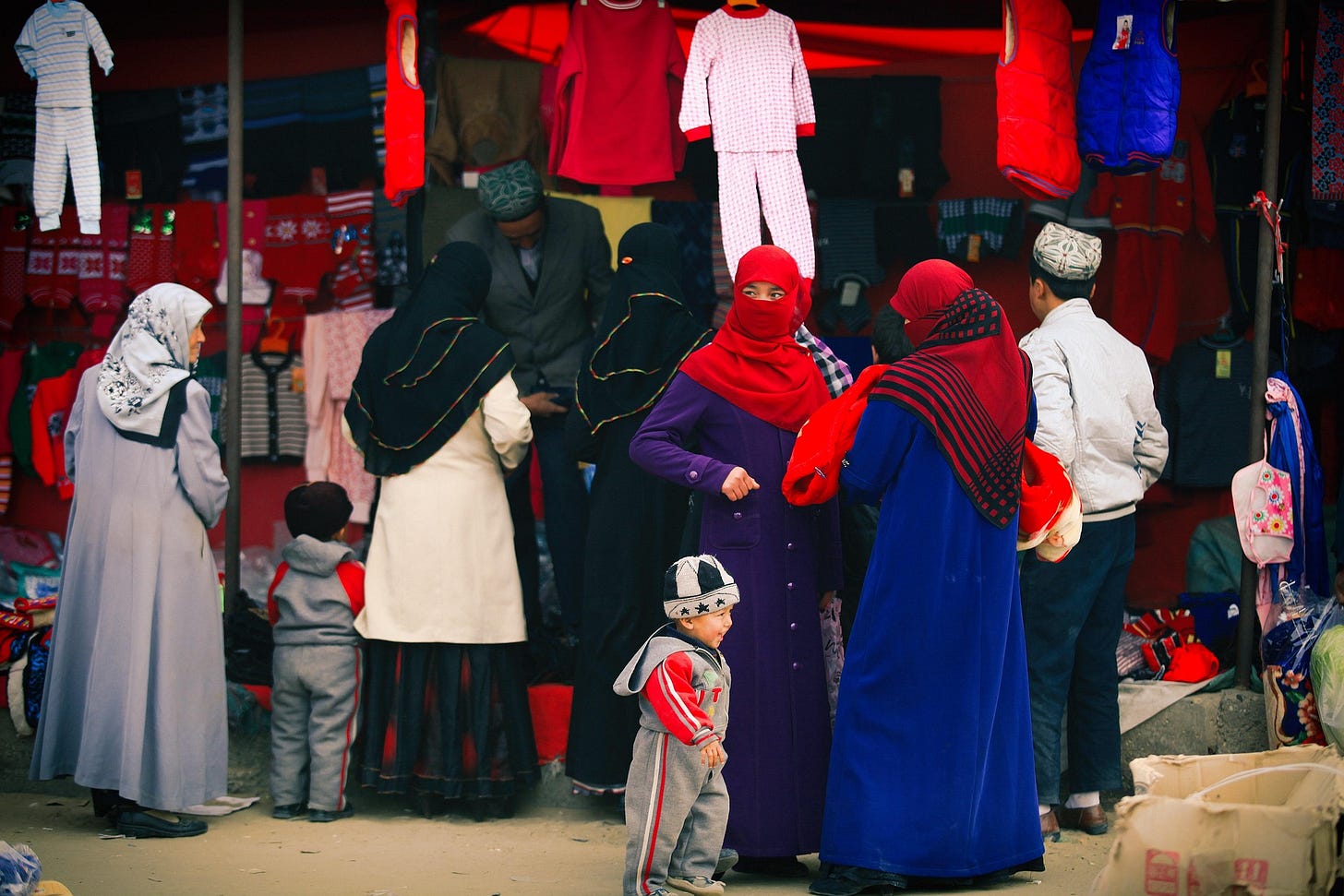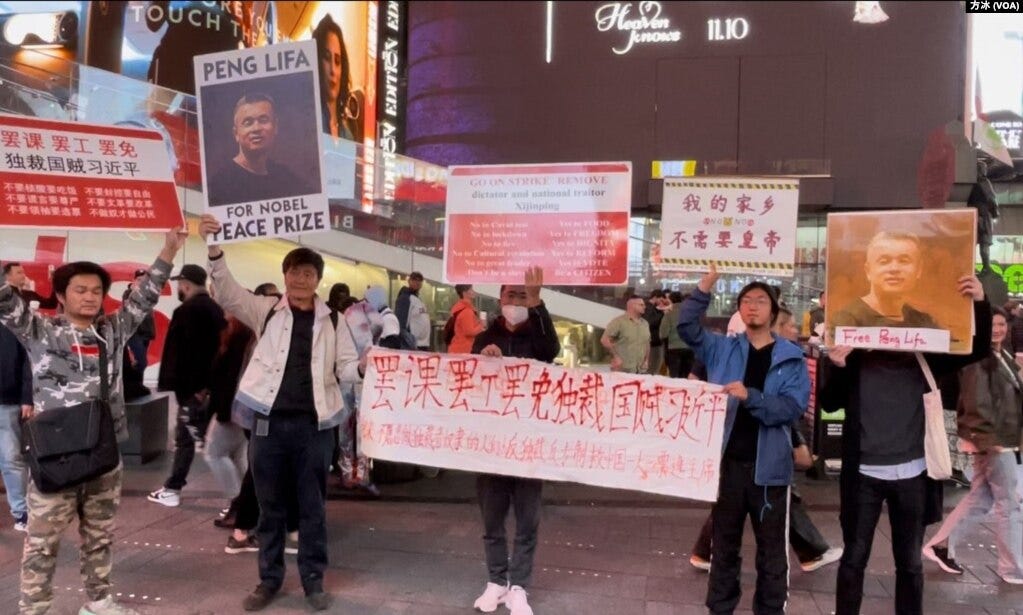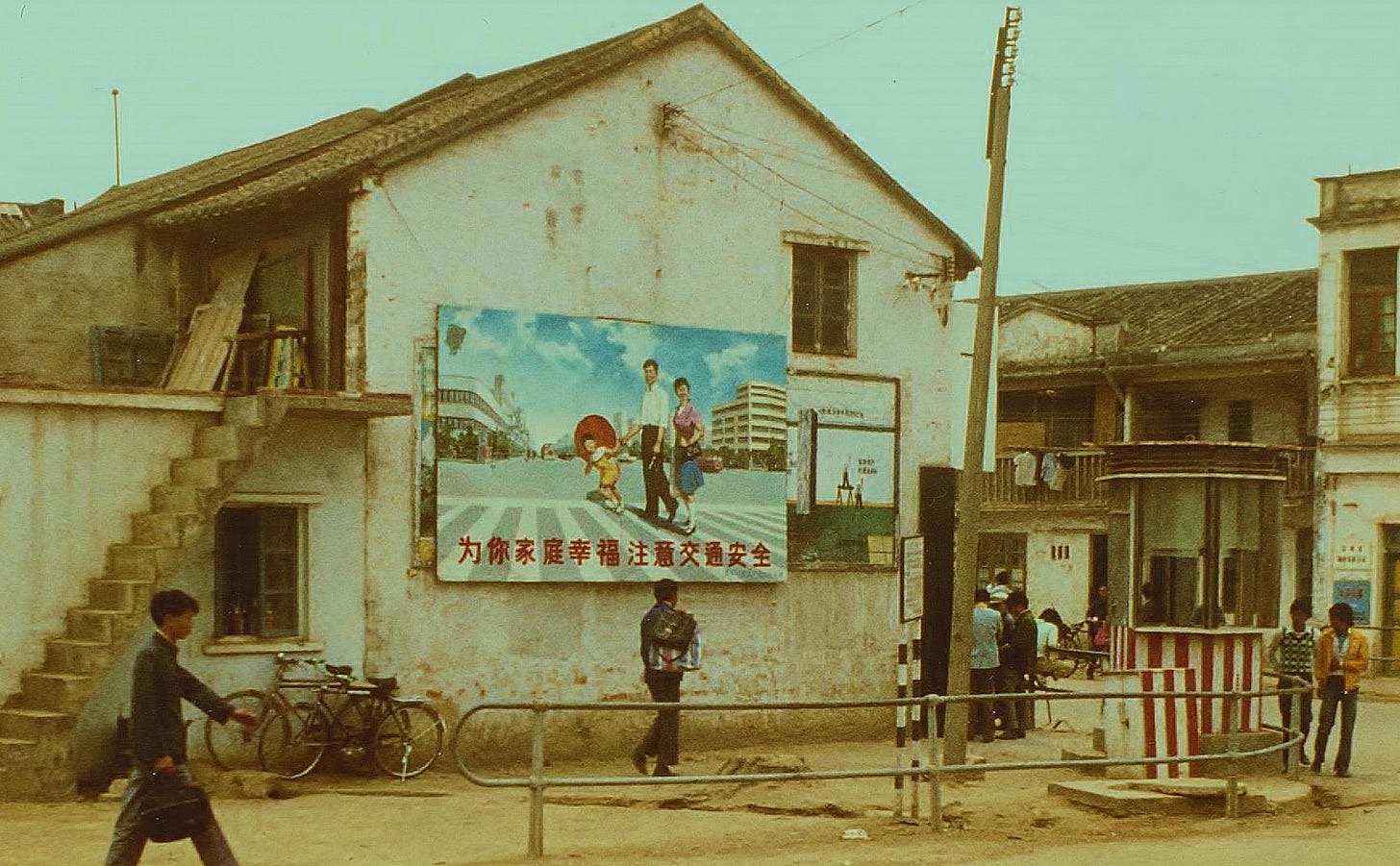China's Reality: Absolute Thought Police, Dissidents Erased Overnight
A chilling warning to the rest: It is common in China to torture and humiliate dissenters, sending them to forced labor or 're-education' camps.
According to the U.S. State Department’s human rights report, the situation in China has steadily deteriorated in 2024. The Communist regime has committed crimes against humanity among ethnic and religious minorities both at home and abroad.
All media is controlled by the authorities and discussing topics deemed unacceptable by the authorities can lead to years behind bars.
The U.S. State Department’s Bureau of Democracy, Human Rights, and Labor publishes an annual human rights report on countries that receive aid or are members of the United Nations. The report covers internationally recognized human rights, including assessments of each country’s freedom of speech and media, freedom of religion and belief, as well as war crimes and crimes against humanity. The assessments are based on data obtained from governments, research, the media, international organizations, and non-profit organizations.
We have previously taken a closer look at the state of freedom of speech in Europe, specifically in Germany, the United Kingdom, and France, which are making considerable efforts to silence and suppress free expression. We have discussed the human rights situation in Russia, and similarly to them, China, according to the U.S. State Department, has fewer and fewer freedoms and rights left to enjoy.
Chinese citizens have been arbitrarily or illegally detained or killed, many have ‘disappeared’, others have been tortured or treated in a cruel, inhuman, or degrading manner, subjected to forced labor or ‘re-education’. Freedom of speech and media are severely restricted in the country; journalists, activists, lawyers, and writers are prosecuted, and independent associations are banned. Censorship is rampant, religious freedom is restricted and activists are forced to return to the country from all over the world.
The details of these cases are often shrouded in secrecy, with little or no information available. News stories disappear from the Chinese media minutes after publication, as did an article in the Chinese media outlet Caixin about the trial of eight Xinjiang police officers who were arrested in 2018 in the Ili Kazakh Autonomous Prefecture for torturing and ultimately killing private individuals (Sun Renze).
Ethnic or religious minorities are sent to re-education camps and prisons
Since 2017, the Chinese authorities have applied a broad definition of extremism. This allows the authorities to detain more than a million Uyghurs, Kazakhs, Kyrgyz, and other Muslims in re-education camps and detention centers. The goal is to instill patriotism in them and erase their religious, cultural, and ethnic identity. Many of those detained in these centers have subsequently been transferred to the formal prison system, convicted in closed trials on false charges, and sentenced to unusually long prison terms.
The Chinese authorities have encouraged racism and institutional discrimination against minorities, especially Uyghurs, and state media outlets publish propaganda describing members of ethnic minorities or religious groups as violent or inferior, and believers as culturally backward and uneducated, and therefore in need of re-education.

The government is making significant efforts to assimilate ethnic and religious minority groups. Strict restrictions have been imposed on minority cultures, languages and religions, and behaviour deemed “extreme” by the government, such as “abnormal” beards or veils, is prohibited. Some Islamic names are also banned, and teaching children about religion is punishable. The Sinicization campaign has imposed restrictions on the movement of ethnic minorities and denied them travel documents. Greater surveillance has been introduced amongst minority communities, including artificial intelligence cameras and armed police. The Xinjiang authorities use a huge database that records the movements of the region’s inhabitants, their use of telephone applications, and even their consumption of electricity and gasoline. In addition, officials have organized so-called household surveys and “home stays”, where they moved into Uyghur homes to investigate signs of “extremism” within the family. At the same time, the authorities are encouraging the migration of Han Chinese, or the majority ethnic group, to minority areas.
The Chinese Communist Party controls the media and adds so-called taboo topics as needed
According to the Chinese constitution, citizens have freedom of speech, press, assembly, association, procession and demonstration, but the authorities do not respect these rights. This is especially true when freedom of speech is used in a way that conflicts with the interests of the Chinese Communist Party. Print media, broadcasting, electronic, and social media channels are under strict state control and tend to be used only to convey the ideology of the government and the Chinese Communist Party (see also here). The authorities censor and manipulate the press, social media and websites, and the Chinese Communist Party constantly monitors all media outlets, even live broadcasts.
According to a report by the U.S. State Department, the Chinese Communist Party and the government do not dictate all published or broadcast content, but they have unlimited power to determine whether, when, and how certain topics are covered, or whether something is banned altogether. This is especially true for certain anniversaries and so-called taboo topics. Known taboo topics include public health and the country’s coronavirus policy, as well as corruption, natural disasters and even the #MeToo movement. Of course, taboo topics also include certain regions and reports from those regions – these include Tibet, Taiwan, Xinjiang, Inner Mongolia and the border areas of Southeast Asia, although the latter have seen a slight decrease in concerning cases.
Strict control also applies to the public image of the Chinese Communist Party and President Xi Jinping. For example, it is not permitted to make use of the image of the children’s book character Winnie the Pooh on social media, since Winnie the Pooh was used to represent Xi Jinping in attempt of avoiding direct censorship. Social media platforms are actively helping along by blocking critical comments related to politicians in power (see also here).

Government regulations restrict and limit access to foreign television programs, which are not allowed to be shown during prime time. Local streaming services must keep foreign programming within 30% of their total content. However, foreign publications require a government import license, including online stores, which are prohibited from offering foreign publications such as books, films and games that have not been approved by the government. In general, books whose content is not in line with official policy are prohibited, and only government-approved publishers are allowed to print books.
The range of charges against those who “break” the rules is varied
Journalists and editors must exercise strict self-censorship to remain within the boundaries dictated by the Chinese Communist Party. Harsh punishments await anyone who dares to question the legitimacy of the Chinese Communist Party, criticize President Xi Jinping, or comment on so-called taboo topics. Anyone who does so will be accused of espionage, subversion, inciting subversion, or picking quarrels and provoking trouble. These are the so-called “basic crimes” which are defined by the Chinese law in such a broad manner that they can be applied to almost all activities and individuals in order to suppress political dissent, activism, and so on. In addition, the state can retroactively designate any information as a state secret and use it as the basis for new charges.
Those who “stray” may face dismissal and demotion, some have been attacked, harassed, stalked, intimidated, and arrested, with criminal and civil proceedings initiated against them. The overall goal is to prevent authors and journalists from disseminating “unauthorized” information. For example, Chinese film director Chen Pinlin was sentenced to nearly four years in prison for his documentary film about the so-called White Paper Protests in 2022. The White Paper Protests refer to protests that took place in major cities across the country, in which Chinese citizens expressed their opposition to the country’s extremely strict coronavirus restrictions. In a three-hour closed court session, Chen Pinlin was found guilty of “causing trouble and problems,” which is a common charge in China against dissidents and human rights activists and carries a maximum prison sentence of seven years.
Many of the journalists and citizens who criticized the restrictions imposed during the coronavirus crisis still remain in custody, and thousands of social media accounts have been temporarily or permanently closed. While film director Chen Pinlin was accused of “picking quarrels and provoking trouble,” Nanjing University lecturer Guo Quan, who criticized the Chinese government’s coronavirus policy, was sentenced to four years in prison for subversion. Guo was taken into custody in 2020, but the sentence was only handed down after three years of pre-trial detention. Journalist and civil rights activist Zhang Zhan “disappeared” shortly after serving a four-year sentence for reporting on the first outbreak of the coronavirus in Wuhan. It is believed that Zhang has been re-arrested and is now accused of “picking quarrels and provoking trouble.”
The authorities have punished or detained citizens for spreading fake news, illegal information, or rumors on the internet. For example, popular influencer Thurman Maoyibei’s accounts on TikTok, Weibo, and Bilibili disappeared overnight after he was accused of spreading false information and rumors. Although the influencer admitted to staging the video, his case is considered one of the largest campaigns by the Chinese authorities, as concordant with it, alleged 63,000 accounts were closed and more than 1,500 influencers and bloggers were arrested. The reasons for the accusations ranged from political views to religious “extremism,” from public health issues to rumors and misinformation.
In retaliation for reports by a journalist living abroad, the journalist’s family members in China also suffered harassment and even arrest. For example, relatives of Uyghur journalists living abroad who work for Reporters Without Borders (RSF) have disappeared or been detained in Xinjiang. According to Reporters Without Borders’ World Press Freedom Index reports for the last few years, more than 100 journalists are currently in detention. Two foreign journalists of Chinese origin were also detained last year on espionage charges: Swedish citizen and publisher Gui Minhai, who was sentenced to 10 years in prison in 2020, and Australian writer Yang Hengjun, who was arrested in 2019 and sentenced to death for espionage, although the execution has been postponed for the time being. According to Yang’s family, he will not appeal the verdict because there is no reason to believe that this will lead to a fair outcome, while appealing could actually jeopardize Yang’s chances of receiving adequate medical aid.
Fear of punishment prevents citizens from discussing political issues, leaders, or taboo topics. Those who are persecuted do not dare to read independent publications for fear of government measures, as the Chinese authorities monitor citizens every day in public places and online, using mobile applications, an extensive network of cameras, and other electronic devices (see also here, here, and here). Some independent think tanks and associations have had to cease their activities. Others describe constant warnings that it is “not advisable” to meet with foreign journalists or diplomats or to attend diplomatic receptions or public events organized by foreign countries. For example, in December, Dong Yuyu, former deputy editor and columnist of Guangming Daily, was sentenced to seven years in prison on charges of espionage for meeting with a Japanese diplomat in Beijing in 2022.
People “disappear” through various forms of detention, often forever
According to the U.S. State Department, in addition to official criminal and civil proceedings, “undesirable” individuals may also disappear. The authorities mainly use two methods for this purpose: Residential Surveillance at a Designated Location (RSDL) and liuzhi detention. In the first case, the authorities remove individuals who are considered a threat to national security or who are intended to be used as hostages, keeping them in isolation at a secret location. According to the data from the human rights organization Safeguard Defenders for 2021, 27,000 to 57,000 individuals were placed under RSDL (and later under court supervision) between 2013 and 2021.
Another method is the liuzhi detention system, which is administered by government and Chinese Communist Party institutions tasked with rooting out corruption. According to the U.S. State Department, detailed data on individuals held in the liuzhi detention system is not available. It is estimated that approximately 3,000 people were held in liuzhi last year.
Those who have “disappeared” under these two methods are often members of minority groups, such as Uyghurs, Kazakhs, Kyrgyz, or dissidents. During their “disappearance,” they have often been victims of physical and psychological abuse, humiliation, rape, torture, starvation, isolation, and forced confessions, with their families not being informed of their whereabouts or the duration of their detention.
For example, in 2023, senior reporter Minnie Chan Man Li of the Hong Kong-based South China Morning Post disappeared after travelling to Beijing to cover a security conference. The journalist did not return home from Beijing, and her social media accounts have been silent ever since. Similarly, since 2022, protester Peng Lifa, who had spread slogans on a bridge in central Beijing demanding an end to the zero-COVID policy and one-party authoritarianism, has disappeared without a trace. According to a report by the U.S. State Department, Peng Lifa’s wife and children were under house arrest in Beijing, and the couple’s relatives were under police surveillance. It has even been reported that the relatives’ home village was closed off entirely to prevent journalists and supporters from entering.

The U.S. State Department report also draws attention to the fact that, to this day, the Chinese authorities have not published reliable data on the people who disappeared, were killed, or arrested after the 1989 Tiananmen Square protests. On the contrary, many of those who protested at the time, as well as their family members, continue to suffer harassment by the authorities. In addition, in 2022, student leader Xu Guang was sentenced to four years in prison for “picking quarrels and provoking trouble”, as he had protested in front of a police station demanding recognition of the Tiananmen Square massacre.

The authorities also use a system of house arrest (Residential Surveillance), which is a form of detention for persons under investigation, whereby the detainee is ordered to remain at their own home. This differs from the RSDL system, where the person is taken to a location chosen by the authorities. Nevertheless, human rights organizations consider house arrest to be a form of arbitrary detention. Some individuals under house arrest are allowed to receive visitors and use the telephone, but for many, all communication is prohibited. According to Safeguard Defenders, between 560,000 and 860,000 individuals have been placed under house arrest since 2012. Citizens have been placed under house arrest during so-called sensitive periods, such as visits by high-ranking foreign officials, the National Congress, and the anniversary of the Tiananmen Square massacre. “Vacations” were also imposed in remote areas, where security officials displaced the individuals from their homes.
The U.S. State Department report cites the following examples of political prisoners who have been detained for years in one way or another or who have disappeared without a trace: writer Yang Maodong (pen name Guo Feixiong); Uyghur scholars Ilham Tohti, Rahile Dawut, and Hushtar Isa; Uyghur writer Yalqun Rozi; Tibetan Buddhist monks Go Sherab Gyatso and Tenzin Khenrab; Tibetan entrepreneur Dorje Tashi; Tibetan singers Lhundrub Drakpa and Trinley Tsekar; activists Wang Bingzhang and Qin Yongmin; Shanghai activist Chen Jianfang; Falun Gong practitioner Zhou Deyong; Shanghai Catholic Auxiliary Bishop Thaddeus Ma Daqin; human rights lawyers and activists Xia Lin, Gao Zhisheng, Xu Zhiyong, and Ding Jiaxi; journalist Yang Zewei; and protester Peng Lifa. Of course, these are just a fraction of lawyers, human rights activists, journalists, religious leaders and believers, representatives of ethnic groups, etc., who are constantly targeted for arbitrary detention or arrest (see also here).
Tibetan singer Lhundrub Drakpa is one of thousands who have been imprisoned for years by the Chinese Communist regime. Drakpa’s crime was to sing songs criticizing the repressive policies of the Chinese authorities.
Prisoners must endure years of torture
Chinese law prohibits the physical abuse or mistreatment of detainees. Suspects must not be forced to make confessions, and prisoners must not be insulted, beaten, or encouraged to commit violence against each other, but in reality the authorities ignore all these rules. Former prisoners have described how they were beaten, raped, given electric shocks, forced to sit on chairs for hours, hung up by their wrists, denied sleep, forced to eat or take medication, and more. Political and religious dissidents were allegedly singled out for particularly harsh treatment. In the liuzhi detention system, which is an extrajudicial means of investigating corruption and misconduct by officials, detainees were placed in solitary confinement, denied sleep, beaten, and forced to sit in uncomfortable positions for hours or even days.
Detainees were also placed in psychiatric treatment against their will. According to a report by the U.S. State Department, China’s Ministry of Public Security operates as many as 23 psychiatric hospitals. Although many of those placed in psychiatric hospitals had been convicted of murder and other violent crimes, there were also reports of activists, believers and others being subjected to forced psychiatric treatment for political reasons. The authorities could place individuals in psychiatric hospitals and force them to undergo treatment for “illnesses” that had no psychiatric basis. For example, health rights activist He Fangmei and her husband Li Xin were arrested in October 2020 after she demanded accountability and compensation for her daughter’s paralysis caused by a defective vaccine she received in 2018 at the age of 10 months. Their three children, including their disabled daughter, suffered abuse, with two daughters being held under observation in a psychiatric hospital and their son being placed under police supervision in Henan. He Fangmei was sentenced in October 2024 to five years and six months in prison for “bigamy” and “picking quarrels and provoking trouble,” reflecting China’s harsh attitude toward fighting for vaccine safety.
The Communist Party’s reach extends abroad
Since 2012, the Chinese authorities have been carrying out widespread international repression, targeting Uyghurs, Tibetans, religious practitioners, dissidents, foreign journalists, and Chinese students and academics at foreign universities. As in China, physical violence, threats, surveillance, abductions, and restrictions on movement are used abroad as well. Supporters of democracy are placed on wanted lists with rewards offered for their capture, and dissidents are suppressed by all possible means.
Freedom House’s 2023 reports documented approximately 250 direct acts of physical repression and extensive campaigns involving digital threats, abuses by international organizations, and the involvement of foreign countries in forced repatriation. For example, in November 2023, during the Asia-Pacific Economic Cooperation meeting in San Francisco, supporters of the Chinese Communist Party attacked those who advocate for democracy in Hong Kong and a free Tibet. Allegedly, the incident was orchestrated by foreign partners of the Chinese Communist Party and leaders of the pro-Chinese Communist Party Chinese diaspora.
Safeguard Defenders’ April 2023 report highlighted 283 cases in which Chinese authorities had forced people from 56 countries to return to China since 2014. This was part of the Fox Hunt and Sky Net operations, which involved 12,000 forced repatriations. Threats were used, family members were punished, and international legal mechanisms were abused. In addition, documents from the cybersecurity company i-Soon (Anxun) were leaked, revealing that the company had carried out cyberattacks on Uyghur, Tibetan, and other minority organizations located abroad, as well as foreign hospitals and governments, e.g. in India, Indonesia, and Taiwan. For example, in the Australian documentary 4Corners, a former Chinese agent revealed his activities in Australia, Japan, Thailand, and Myanmar. His task was to monitor dissidents and lure them to Cambodia or Laos, countries suspected of allowing the Chinese authorities to operate freely.
According to official sources, population control has almost been abolished, but not for unmarried women
China’s decades-long one-child policy was enforced through social pressure, education, propaganda, and economic penalties, as well as mandatory pregnancy checks, forced contraception, sterilization, and abortion. The penalties for exceeding the permitted number of children varied from province to province. As the law only addressed the right of married couples to have children, officials generally interpreted it to mean that unmarried women were not allowed to have children. However, unmarried women who had children could be subject to social penalties and denied birth certificates and regional residence permits (hukou). Admittedly, the latter were rarely enforced by local authorities. Particularly cruel population control measures were, of course, imposed on women from ethnic and religious minorities, especially Uyghurs and Kazakhs, who had to endure the harshest coercive measures. Han Chinese who exceeded the permitted number of children risked detention centers, but were not subject to excessive fines.

It is well known that the state has slightly relaxed its family planning laws in recent years. Most people are now allowed to have three children (up from two in 2021). Couples can also apply for permission to have a fourth child if they meet local and provincial requirements. The law contains provisions aimed at increasing the birth rate and “reducing the burden of raising children.” Some provinces have abolished all restrictions on the number of children and the right of unmarried women to have children, such as Sichuan Province, but even there, only for five years, starting in 2023. There are other provinces where a marriage certificate is no longer a prerequisite for having a child, but implementation is uneven, and it is still difficult for unmarried women to obtain treatment and benefits during pregnancy. In addition, unmarried women are prohibited from undergoing artificial insemination and egg freezing, although unmarried men are allowed to freeze their sperm.



They mistakenly convince themselves that judgement will not come upon their heads. As if re-education, punishment and deaths of non-communist thinkers would do something to exalt the Chinese communist ungodly regime to eternal rule, the problem of Chinese people believing this is the best government is a lie prolonged by force. Nobody there in China has freedom to live in truthful ways while censorship leads to punishment, which leads to death.
Communism cannot overcome death. Those walking around believing the lie of a glorious acceptance of the works of the apparat in the hearts of the Chinese people, those who tyrannize and kill people for seeking spiritual life both inwardly and outwardly, other than the phony glorious progression of The Long March of Mao, are the evil spirits that ungodly communism outwardly denies.
It is very clear something is wrong in this evolution of human attempts to control each other, to smooth out the wrinkles in their civilization by forbidding honor to the Creator of their very lives.
The goodness of life isn't of human origin, but of God -- and the communists hate to lose control of humans in their communities. The people might find the true good Nature within their souls,and the exposure of the sins and errors of communism will be a final death, those clinging to it to save face and power will not prevail over free people. The truth will set China's people free as they are encouraged that the lives of people in other parts of this Earth are more valued than how their great leader treats them.
Of course, that could never happen here in the UK....